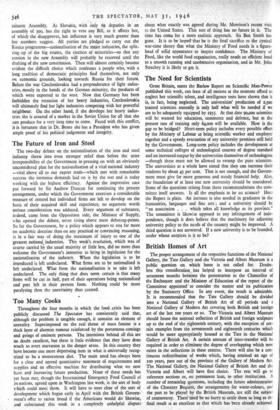The Need for Scientists
Great Britain, states the Barlow Report on Scientific Man-Power published this week, can least of all nations at the moment afford to neglect her scientific talent, and intelligence tests have shown that it is, in fact, being neglected. The universities' production of 2,500 uained scientists annually is only half what will be needed if we are to be adequately equipped by 1955. At that date 9o,000 scientists will be wanted for education, commerce and defence, but at the present rate of training only 64,000 will be available. How is the gap to be bridged? Short-term policy includes every possible effort by the Ministry of Labour to bring scientific worker and employer together and a speedy evacuation of any university premises still held by the Government. Long-term policy includes the development at some technical colleges of technological courses of degree standard and an increased output by the universities themselves of technologists —though these must not be allowed to swamp the pure scientists. The universities as a whole have stated that they can increase their students by about 45 per cent. That is not enough, and the Govern- ment must give far more generous and steady financial help. Also, the foundation"of at least one new university should be considered. Some of the questions arising from these recommendations the com- mittee itself answers. Is all the emphasis to be on science? Her: the Report is plain. An increase is also needed in graduates in the humanities, languages and fine arts ; and a university should be "an association . . . which takes all knowledge as its province." The committee is likewise opposed to any infringement of inde- pendence, though it does believe that the machinery for adjusting university policy to the needs of the country might be improved. A third question is not answered. If a new university is to be founded, under whose auspices is it to be?






























 Previous page
Previous page